When you think of web development, along with HTML, CSS, and JavaScript , PHP is another programming language that is widely employed. It is the most popular back-end programming language for web development. According to the survey by w3techs , 77.4% percent of websites use PHP. This statistic proves that PHP is among the most widespread languages. Still, many developers consider PHP dead and crappy.
PHP is an acronym for Hypertext Preprocessor. It is an open-source server-side scripting language specially designed for back-end web development. Besides web development, another popular use case of PHP is the content management system (CMS). The most popular CMS, WordPress, is developed in PHP.
To facilitate the development of websites, web applications, and content management systems, PHP provides a plethora of frameworks. Frameworks help developers create robust PHP applications quickly and efficiently by providing the foundational structure. Though PHP itself is able to make dynamic web applications, its frameworks ease the process of developing web applications by saving developers the time to build everything from scratch.
As there is a wide ecosystem of PHP frameworks, it can be pretty confusing to choose the right for your project. This article aims to make you aware of some of the best PHP frameworks, along with their features, pros, and cons, to help you choose the best one. Before delving deeper into the list, let us first understand a PHP framework and why we need it.
What is a PHP Framework?
Let us first discuss the general definition of a framework. It is a software program that comes with pre-written code to accomplish specific tasks. Or, more simply, it is a collection of libraries (predefined code in the form of methods and functions) and APIs. It serves as a foundation for developing applications.
Alternatively, a framework is a template consisting of various modules and packages to accelerate the development of software applications.
Check out: What is a Framework?
A PHP framework is a software program consisting of various modules and packages to develop PHP applications. It provides libraries for common and low-level features included in web development, which eliminates the need for developers to write everything from scratch.
Why Do We Need a PHP Framework?
Here are some significant reasons why you should use a PHP framework:
-
Rapid Development
Since PHP frameworks come with built-in libraries to accomplish certain tasks, there is no need to write code for those tasks from scratch. This results in reduced development time.
For instance, consider that you need to perform testing. Many PHP frameworks come with the PHPUnit library that facilitates testing. One more example is CakePHP, a popular PHP framework. It is equipped with a command-line tool called Bake. This tool can create any skeleton code you need in your application.
-
Requires Writing Less Code
As PHP frameworks provide ready-made modules and functions, you do not have to write lengthy code. The task of writing code gets reduced as frameworks provide you with many libraries to accomplish low-level tasks.
-
Provides Libraries for Common Tasks
There are many tasks in web development that are common for all web applications. Some of these tasks are form validation, CRUD operations, and form validation. PHP frameworks provide libraries for these common tasks. So, you do not have to write any code for these common tasks. You can simply use the ready-made code snippet.
-
Leverages Good Coding Practices
Many PHP frameworks force developers to adhere to the best coding practices . For instance, some frameworks require you to split your entire code into a number of directories based on the function. In short, frameworks force you to create your source code clean, tidy, and maintainable.
-
More Secure
Web applications are susceptible to potential cyber threats, such as SQL injection, cross-site scripting, and many others. As a result, you need to take the appropriate precautions to protect your website.
However, it is important to remember that using a framework is not a substitute for writing secure code. Instead, it reduces the risk of security exploitation by hackers. Many PHP frameworks come with built-in data sanitization and protection against potential threats.
-
Improved Teamwork
When you are working on large projects that require multiple developers, there are chances they may go wrong if there are not proper code standards, documentation, and design decisions. When you use a framework, it defines ground rules and follows standard coding practices.
What Factors to Consider While Choosing a PHP Framework?
Here are some points that you must take into account while choosing a PHP framework:
- Low-Learning Curve: If you are an absolute beginner, you must look for a framework that has a low learning curve. The reason is that no one wants to invest a lot of time learning a new framework.
- Easy to Use: Look for a framework that is easy to use so that it saves your time during development.
- Technical Requirements: The framework you choose should meet all your project’s technical requirements. In addition, verify that the framework supports the database you choose.
- Feature-Rich: Select a framework that offers a wide range of features if you are working on large-scale projects. You can choose a framework with minimal features if your project is simple and small.
- Support and Documentation: When your framework provides comprehensive documentation, you will learn to use it quickly without any hassle. Also, support plays a vital role. The framework should provide round-the-clock support in case of any issues.
10 Best PHP Frameworks For Web Development
Here is the list of the best PHP frameworks that help you develop web applications more efficiently and effectively.
1. Laravel
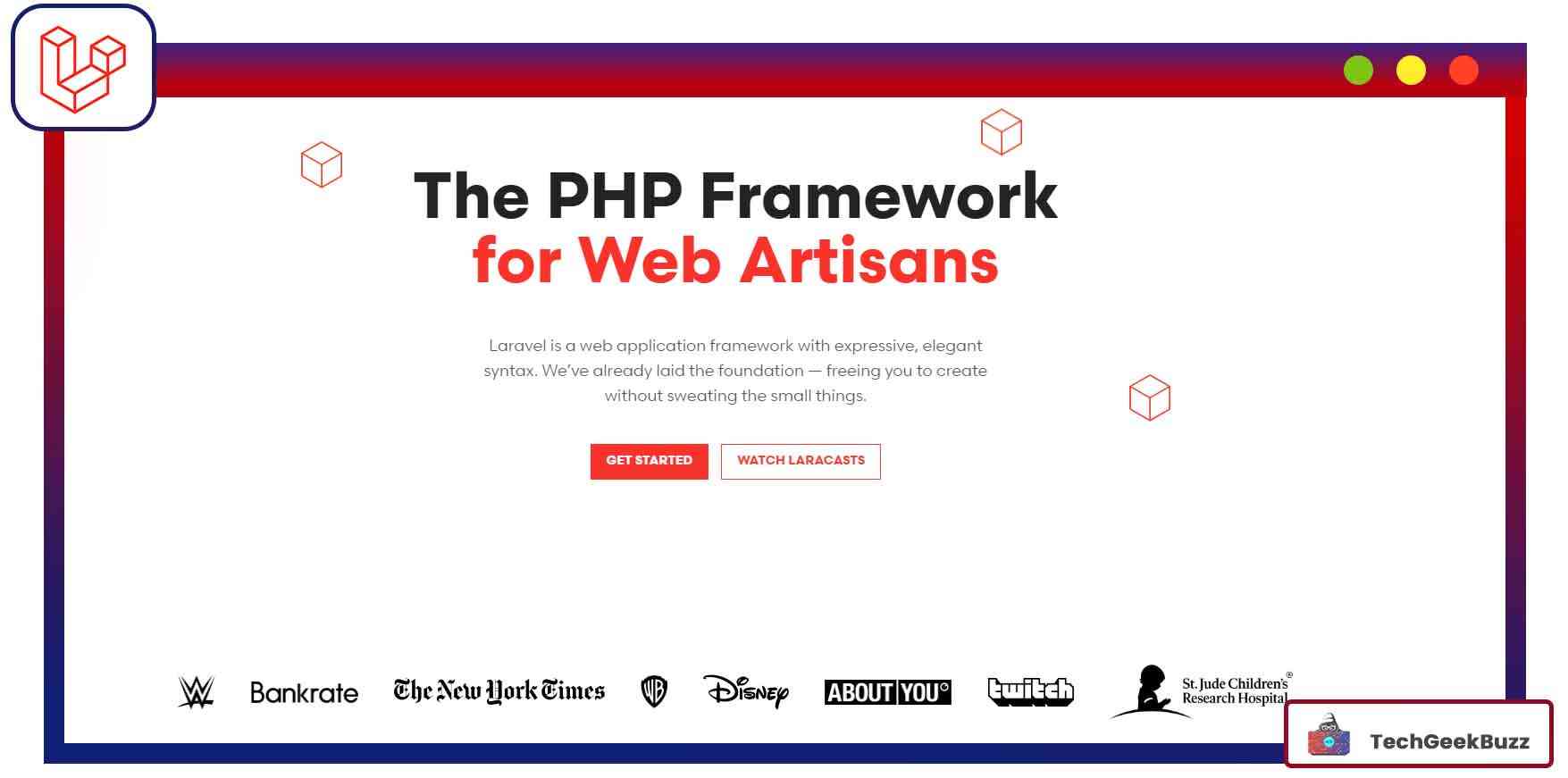
It is an open-source PHP framework and, by far, the most popular framework for PHP. It is labeled as “The PHP Framework for Web Artisans.” Developed by Taylor Otwell and released in June 2011, Laravel is based on the model-view-controller (MVC) architectural pattern. It comes with a plethora of built-in functions and features that make customization of web applications easy.
Laravel is specially designed to make complex web applications that can also deal with data binding. It provides high security with its authentication feature, which is one of the reasons why big enterprises use it for powering their official websites.
This framework comes with packages through which you can extend it. You can use Laravel-specific packages that extend only the Laravel framework. In addition, there are framework-independent packages that can extend any PHP framework. For instance, Laravel Debugbar is a widely used package that adds a toolbar to your projects that comes in handy during debugging.
Furthermore, it reduces the complexity involved in implementing common tasks, such as routing, queueing, authentication, and sessions. It also provides instant hosting and a deployment platform, along with screencast tutorials. Another commendable feature of Laravel is Homestead. It is a vagrant machine that provides a complete web development environment with a virtual machine. This lets you create PHP applications without the need for a web server and install PHP on your local machine.
Features
- Comes with a built-in authentication system.
- Provides an innovative template engine for creating dynamic websites.
- Has a built-in ORM with easy PHP Active Record implementation.
- Provides unique unit testing.
- Has a built-in tool for the command line called Artisan.
- Modular in nature.
|
Pros |
Cons |
|
|
Some Big Companies Using Laravel
- Big Drop Inc
- IndiaNIC
- CIS
- Innovify
2. CodeIgniter
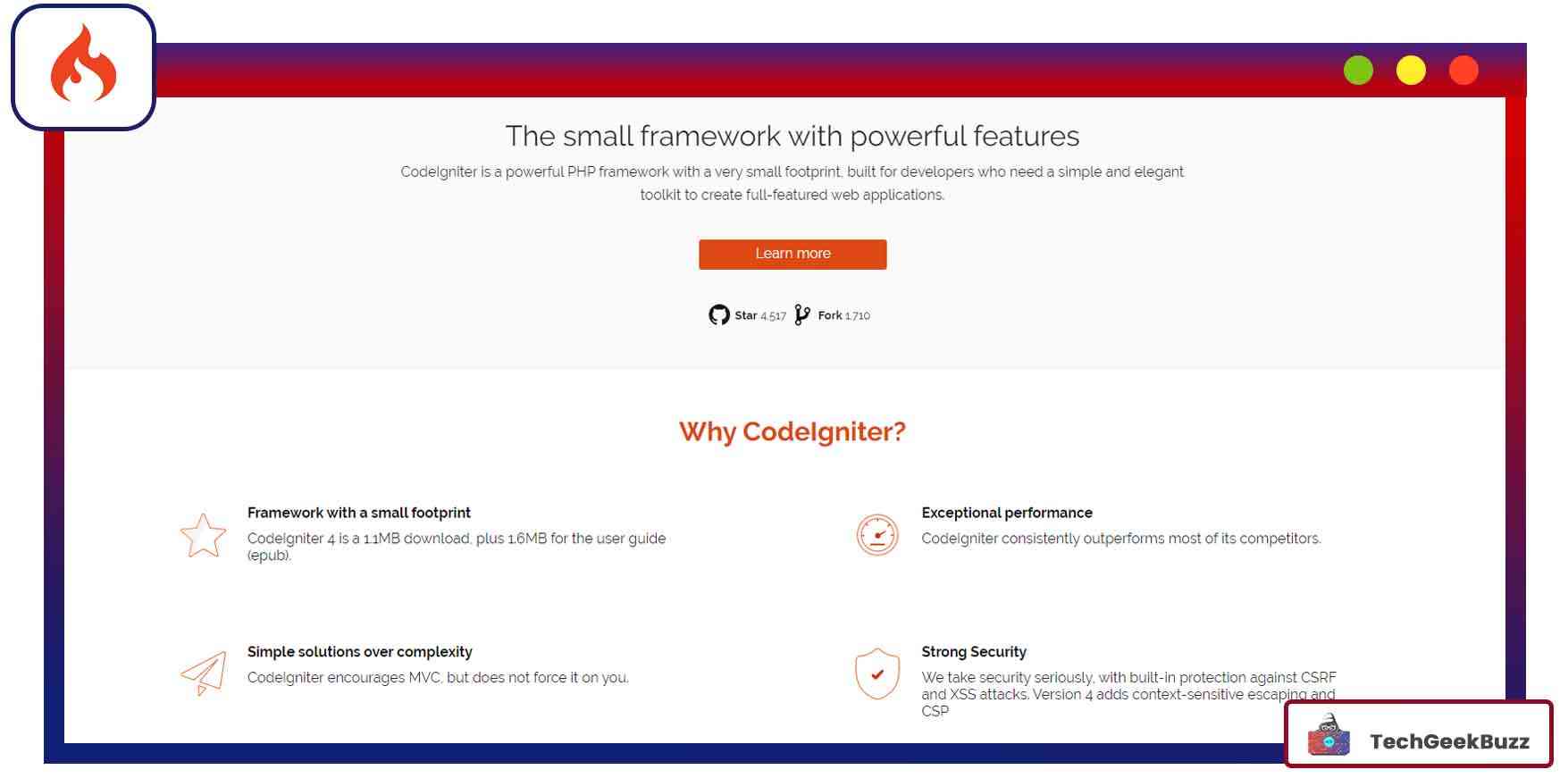
It is a powerful PHP web framework with a storage size of less than 1.2 MB. As a result, it is a lightweight PHP framework. Like other PHP frameworks, CodeIgniter is also used to create dynamic web applications. Due to its lightweight build and hassle-free installation process, it is an ideal framework for PHP beginners.
Web applications that you develop using CodeIgniter have faster loading speeds and leave smaller footprints on the web server. In addition, this framework provides features, like security, encryption, easy error handling, and negligible PHP adaptation. Its well-organized and extensive documentation helps learners to get the most out of the framework.
CodeIgniter follows both MVC and non-MVC design patterns. Developers working on large projects can employ the MVC design pattern, while individuals working on small and simple projects can go without MVC.
More importantly, the framework comes with built-in security tools, including context-sensitive escaping, content security policies, and protection against cross-site forgery and scripting.
Important Features
- Extremely lightweight.
- Generates SEO-friendly URLs.
- Comes with a wide variety of libraries that facilitate various tasks, such as manipulating images, sending emails, form validation, etc.
- Supports full-page caching.
- Supports flexible URI routing.
|
Pros |
Cons |
|
|
Some Big Companies Using CodeIgniter
- Woodbox
- Dompet Dhuafa
3. Symfony
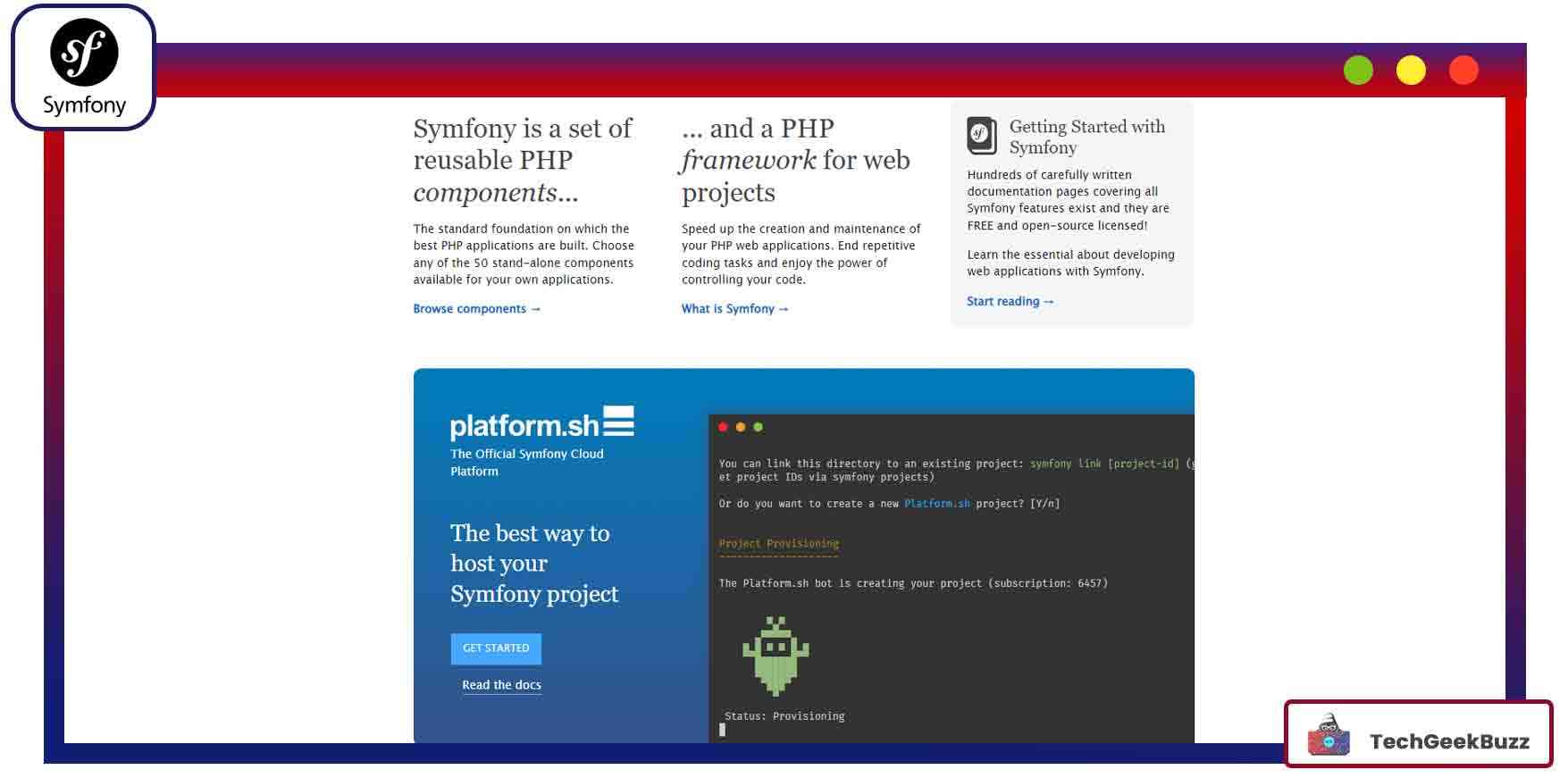
It is a highly flexible PHP web application framework developed by Fabien Potencier and released on 22nd October 2005. It is the sole PHP framework that complies with the standards of PHP and the web. Based on the MVC architecture, Symfony is primarily ideal for developing large and complex projects.
Based on the modular component system, Symfony allows you to choose from over 50 reusable components. It uses the Twig template engine, which is extremely fast and has a concise syntax. In addition, you will get a built-in debugging tool.
Additionally, it offers an easy installation process and supports most platforms. Most developers choose Symfony over Laravel because of its reusable libraries. These libraries help you accomplish many common tasks, including authentication, templating, and object configuration. Also, it has a very huge and active community, and many popular management systems, such as OroCRM and PHP Bulletin Board (PHPBB), use this framework.
Important Features
- Follows the MVC (model-view-controller) architecture.
- Flexible URI routing.
- The Twig template engine.
- Supports session management and error logging.
- Provides high performance.
|
Pros |
Cons |
|
|
Some Big Companies Using Symfony
- Spotify
- Trivago
- Dailymotion
- Vogue France
4. CakePHP
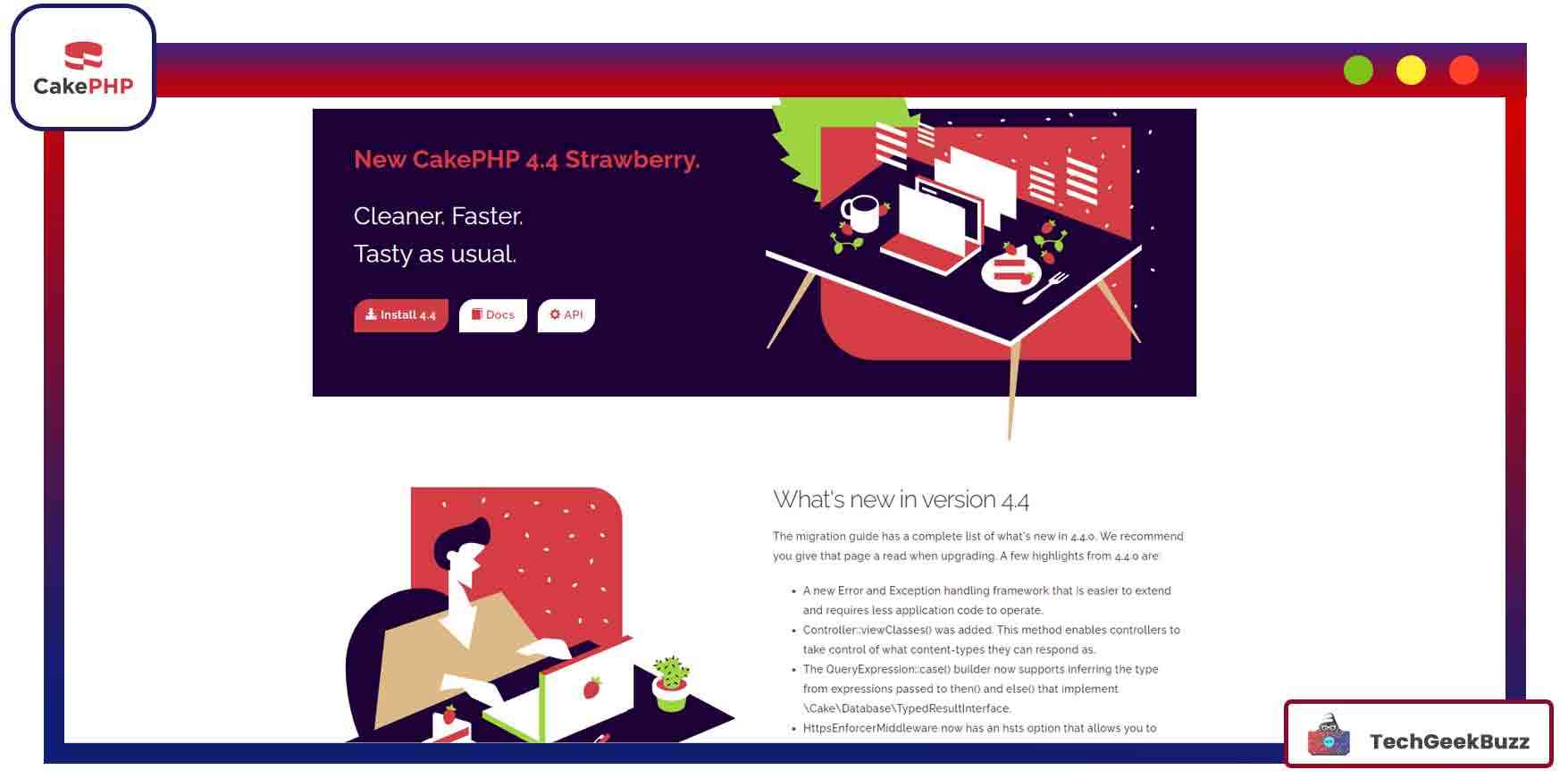
CakePHP is one of the simple PHP frameworks with a low learning curve. It is the first PHP MVC framework specially designed to develop visual interfaces and fully-featured dynamic websites. It follows the principle of convention over configuration. This means that every user or developer needs to follow the coding guidelines the framework provides. These guidelines encourage a uniform coding environment, but it may take time to master them.
Moreover, this PHP framework works on the CRUD principle, which stands for Create, Read, Update, and Delete . The new version of the framework supports the creation of standalone libraries and has improved modularity.
CakePHP developed by Cake Software Foundation, Inc. in April 2005, provides support for many operating systems. It is an ideal framework for a beginner because of its easy installation process and low learning curve.
Even though it is a very simple web framework, it does not compromise security by any means. It provides protection against different online threats, including SQL injection attacks, cross-site scripting, and cross-site request forgery.
Important Features
- Follows the MVC architectural design pattern.
- Comes with built-in validation and a template engine.
- Built-in ORM.
- Makes CRUD-database interactions easy.
- Works from any website directory.
- Multiple support channels.
- An array of components.
- Proper class inheritance, validation, and fast builds.
|
Pros |
Cons |
|
|
Some Big Companies Using CakePHP
- Cotter Web Enterprises
- Jabico Enterprises
5. Zend Framework (Laminas Project)
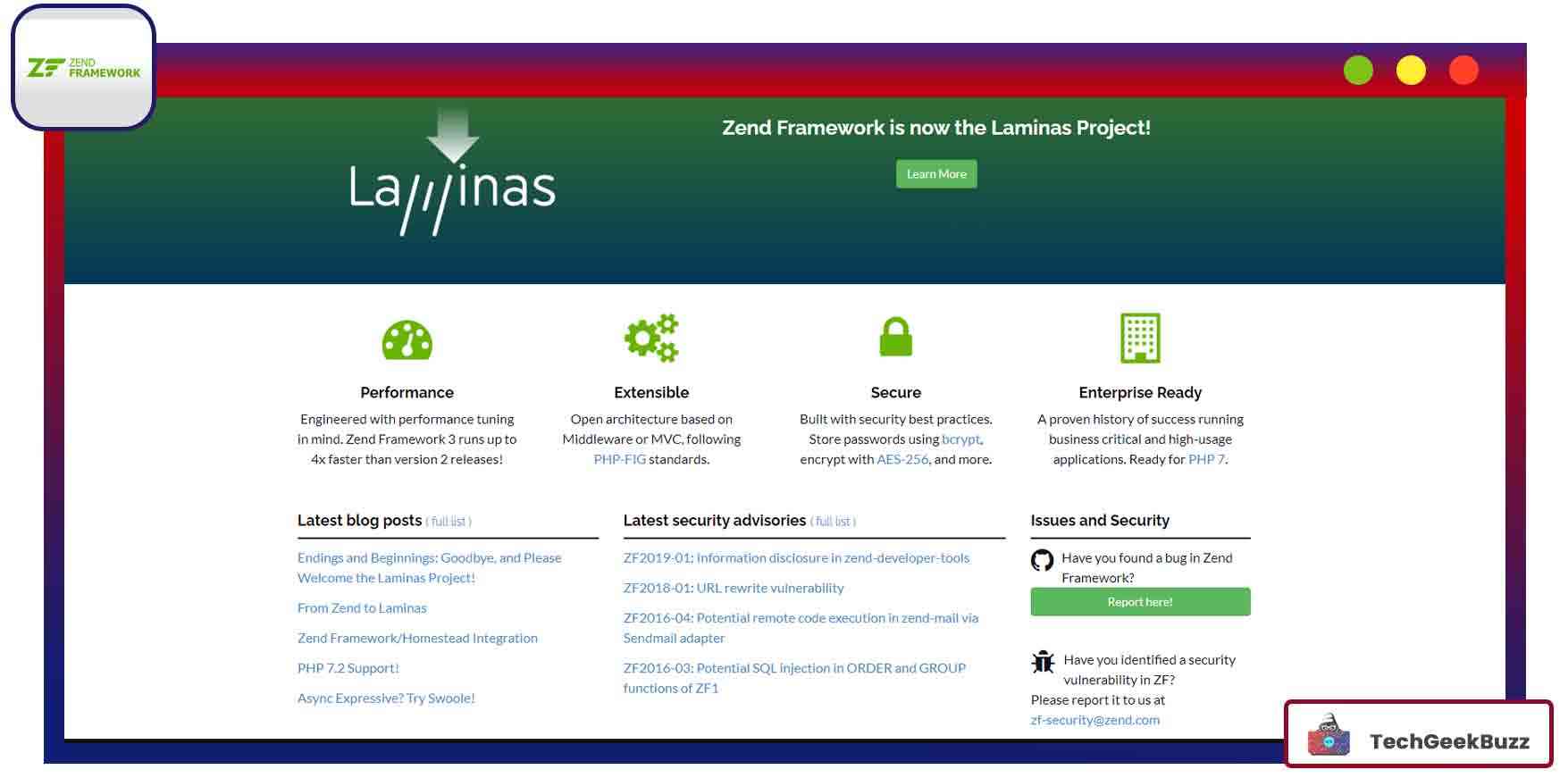
Zend Framework is an open-source web application framework developed by Zend Technologies and released on 3rd March 2006. It is an object-oriented framework based on the MVC architecture that helps developers write bug-free and crash-proof code. It is built on top Agile methodology and helps developers create high-quality, enterprise-level applications.
Additionally, this framework was aimed at providing security, speed, high performance, and maintainability. It comes with support for relational database systems, including MySQL , IBM, Oracle, and SQLite. It provides features like form validation, authentication, and encryption. As a result, it is ideal for creating big enterprise projects. However, it is important to note that this framework is not ideal for rapid development.
Some additional features this framework provides include a drag-and-drop editor, online debugging tools, coding tools, and a scalable interface. But, this framework is ideal only for experienced developers.
Important Features
- A purely object-oriented MVC-based framework.
- Comes with a simple cloud API.
- Flaunts flexible URI routing.
- Supports developing RESTful APIs.
- Session management.
- Seamless integration with PHPUnit for testing and other external libraries.
|
Pros |
Cons |
|
|
Some Big Companies Using Zend Framework
- BBC
- AutoTrack
- Cisco Webex
- Serpro
- Melis Technology
- Netretail Holding
6. Yii 2 Framework
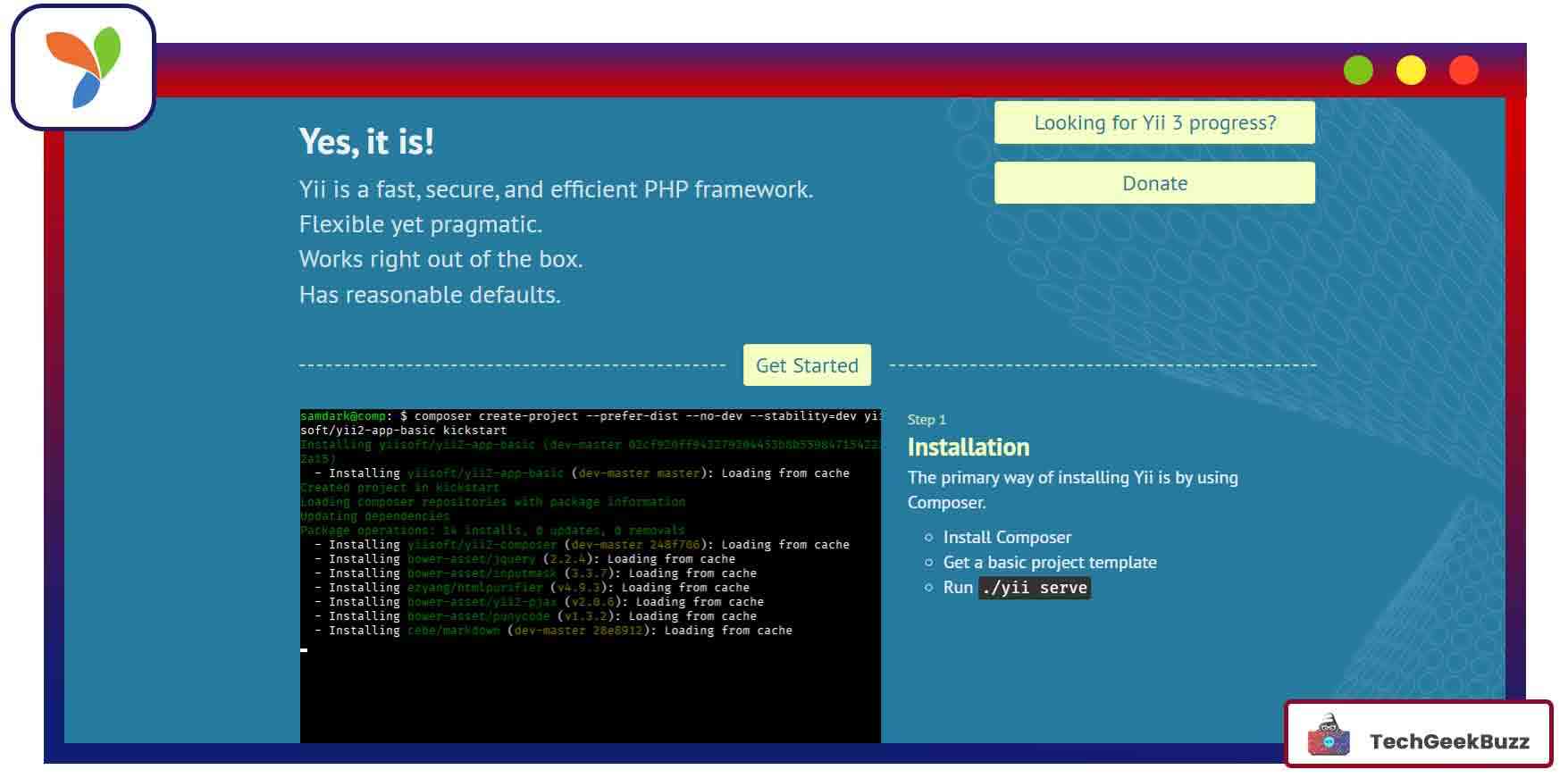
It is yet another simple object-oriented PHP framework with a low learning curve, and thus, it is an ideal framework for beginners. Yii is an acronym for Yes, it is! and like other PHP frameworks, it also follows the MVC architecture. It is an ideal framework for developing large-scale websites. This is because it can integrate easily with jQuery and AJAX features.
This framework provides high performance by adding the least possible overhead. It is faster than other PHP frameworks because it employs the lazy loading technique. Also, it comes with multiple packages to provide security and a set of configurations to make things faster.
Another major feature of Yii is it comes with a class code generator called Gii. The primary function of Gii is to make the process of rapid prototyping and object-oriented programming easy and simple.
Important Features
- Requires less time for development.
- Error handling and logging.
- Short rapid development time.
- User-based authentication controls.
- Provides a skinning and theming mechanism.
- Supports fragment caching, data caching, dynamic content, and web caching.
- Automatic code generation.
|
Pros |
Cons |
|
|
Some Big Companies Using Yii Framework
- Crowdcube
- Purple – retail
- YMCA
- Pastebin
- Fast Company Events
7. FuelPHP
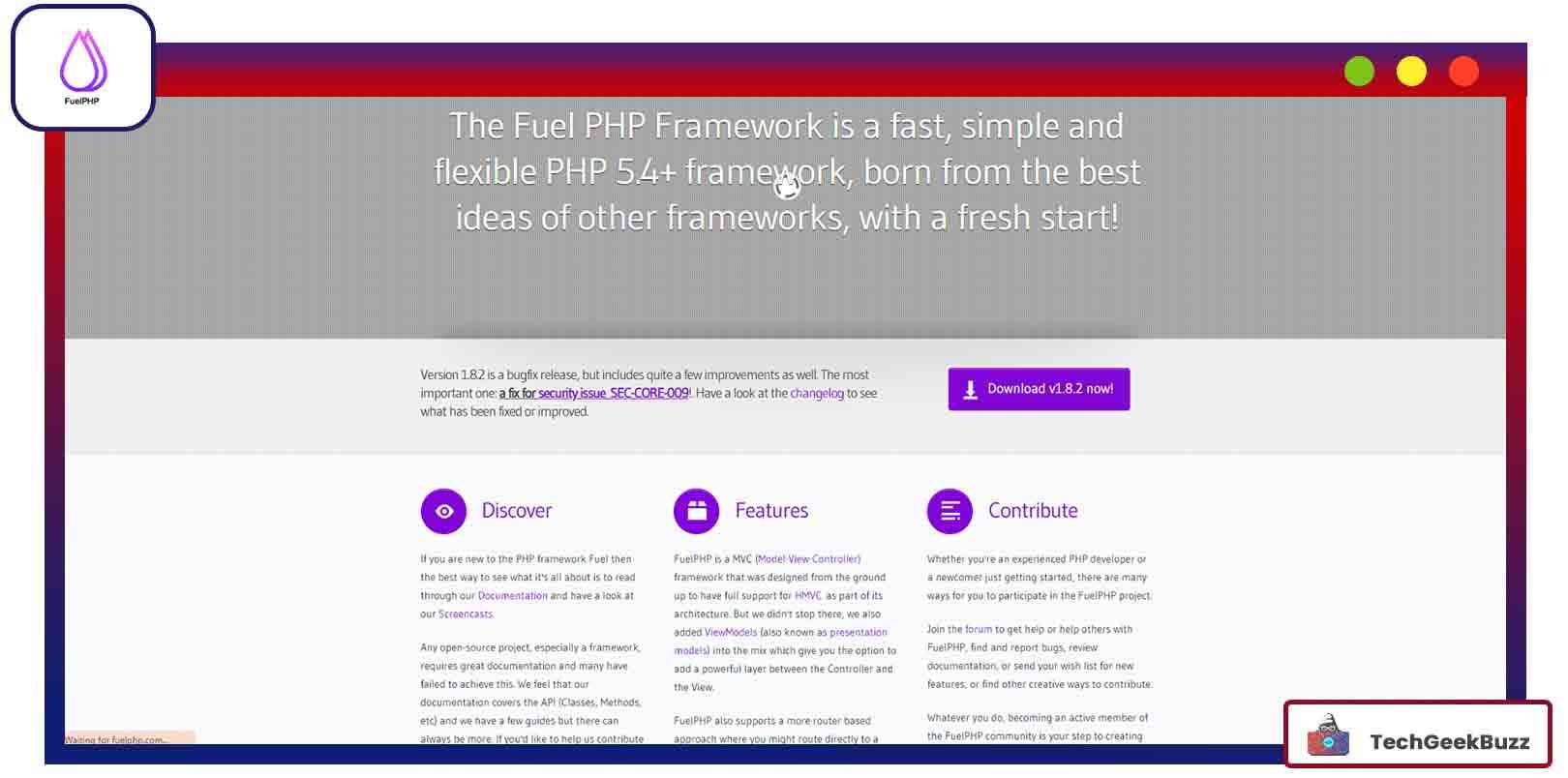
It is a fast, simple, and flexible PHP framework. Compared to others on the list, it is a new and free framework. Although it is based on the MVC architecture, it also supports the HMVC (Hierarchical model-view-controller) architecture, a successor to MVC. It lets developers separate the testing parts of web applications by letting them have more than one controller.
The FuelPHP framework also supports a router-based approach where you might route directly to a closure that deals with the input URL, making the closure the controller and giving it control of further execution.
Furthermore, FuelPHP is a more security-concerned framework and offers out-of-the-box security features. The framework provides common security features, including output encoding, vulnerability protection, input filtering, and Query Builder to stop SQL injection attacks.
So, if your project’s primary concern is security, FuelPHP is the best option on the list.
Important Features
- Comes with a flexible URI routing system.
- Supports REST API development.
- Comes with a lightweight ORM model.
- Supports exception handling and session management.
- Has autoloading classes.
- Built-in caching system.
- A command-line utility called Oil.
|
Pros |
Cons |
|
|
Some Big Companies Using FuelPHP
- Wan Wizard
- Front Desk
8. Phalcon
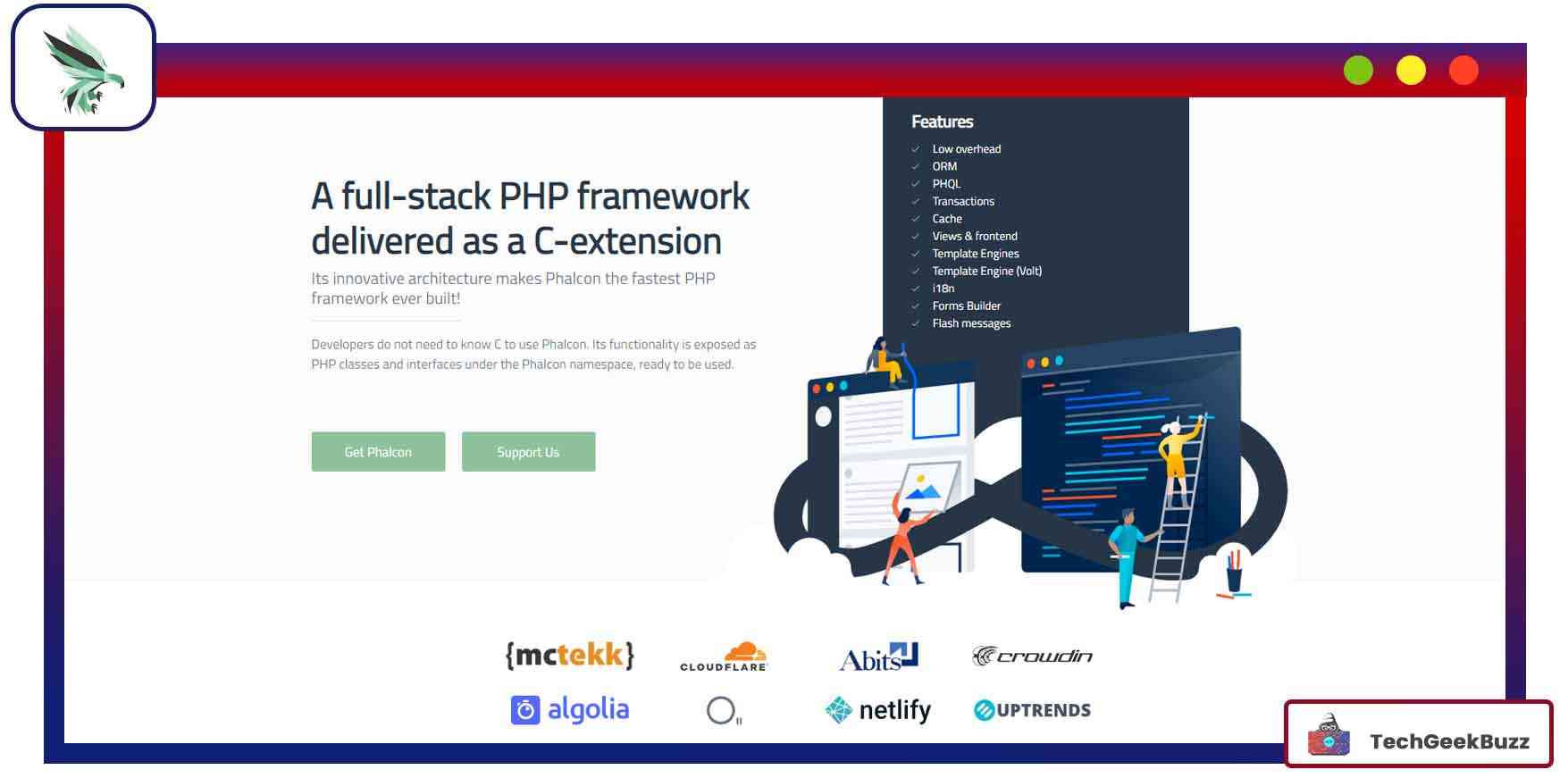
Developed by Andres Gutierrez and released on 14th November 2012, Phalcon is a full-stack PHP framework based on the MVC architecture. Written in the C programming language , Phalcon is an open-source PHP framework that is free to use. Being a lightweight framework, it tends to be one of the fastest. Once you install this framework, it lets you add only those libraries and functions that you need. Hence, you can keep the web development process clutter-free.
Some of its key features are fast execution speed, asset management, a universal autoloader, top-notch security, and caching. Also, the latest release of the framework supports ORM and PHP 7.
Important Features
- Comes with a powerful template engine called Volt.
- Supports routing and caching.
- Built-in security.
- Efficient memory usage.
- Loosely coupled.
- A multi-user system.
- Seamless integration with PHPUnit for testing.
|
Pros |
Cons |
|
|
Some Big Companies Using Phalcon
- Learny Online
- Outsmart
- Marchi Auto
9. PHPixie
PHPixie initially started as a micro web framework, and today, it has grown as one of the best full-stack PHP frameworks. It is an open-source PHP framework that follows HMVC (Hierarchical model-view-controller) architectural design pattern. It primarily concentrates on the development of high-performance read-only websites.
This component-based framework is developed using independent and unit-test components, including ORM, Auth, validate, and HTTP. You can use these components without the framework. The bundle system helps you reuse code and share it with the community. Some significant features of this tool include ORM caching, authentication and authorization capabilities, and input validation.
Important Features
- Low coupling.
- HMVC architecture.
- Independent components that are unit tested.
- Supports the MongoDB database.
|
Pros |
Cons |
|
|
10. Slim
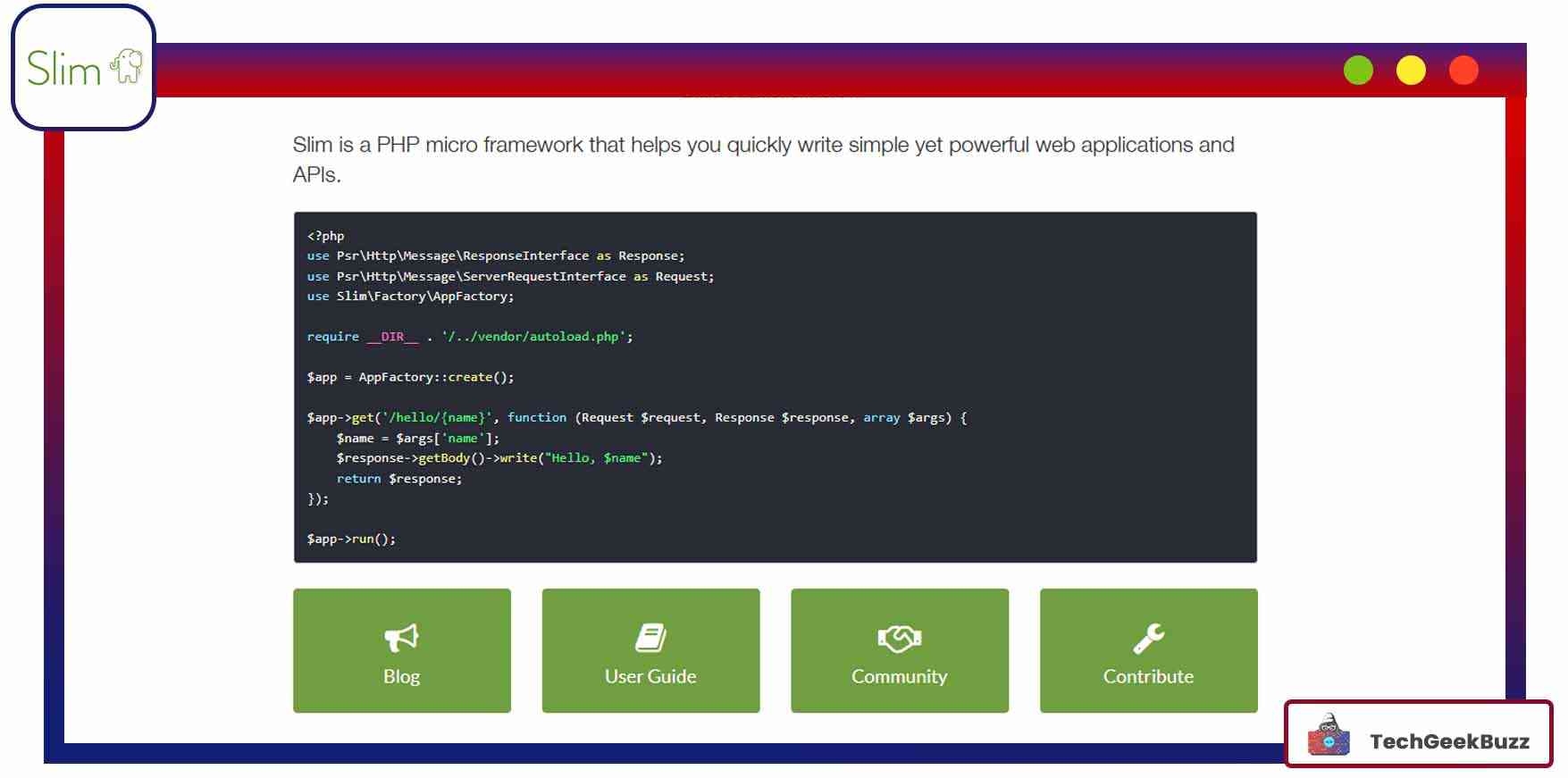
Slim is another powerful yet simple PHP micro-framework for creating simple and small web applications. As it is a micro web framework, it does not provide the features of a full-stack framework. Like other simple frameworks, Slim also has a low learning curve.
Being a microframework, Slim is minimalist in nature. But, it provides features including client-side HTTP caching, session and cookie encryption, URL routing, and support for flash messages across HTTP requests. As a result, it is most preferred among developers who aim to create robust web services and REST APIs.
Furthermore, Slim supports different URL types, such as parameter-based and pattern-based URLs. Another excellent feature of Slim is middleware. It adds layers on top of your application that can tweak HTTP requests and response objects. Also, the middleware helps to protect your application from cross-site request forgery.
Important Features
- Provides a fast and reliable HTTP router. This router maps route callbacks to specific HTTP request methods and URLs.
- Ideal for building applications with concentric middleware.
- Supports dependency injection.
- PSR-7 HTTP message implementation is available.
- Client-side HTTP caching.
|
Pros |
Cons |
|
|
Some Big Companies Using Slim
- Top Web Comics
- Canine Principles
- CG Forge
- Betterplace Academy
Conclusion
Here ends our list of the best PHP frameworks that facilitate the development of web applications. Each framework comes with its own set of features and benefits. If you are looking for fast PHP development, then you can go for CodeIgniter, Phalcon, and FuelPHP. CakePHP, Yii Framework, and Slim are ideal for beginners. On the contrary, Laminas Project and Symfony are ideal for developing big projects.
People are also reading:
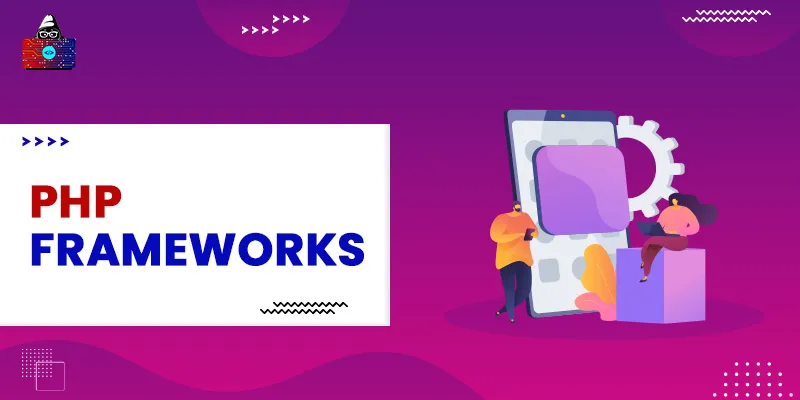




Leave a Comment on this Post